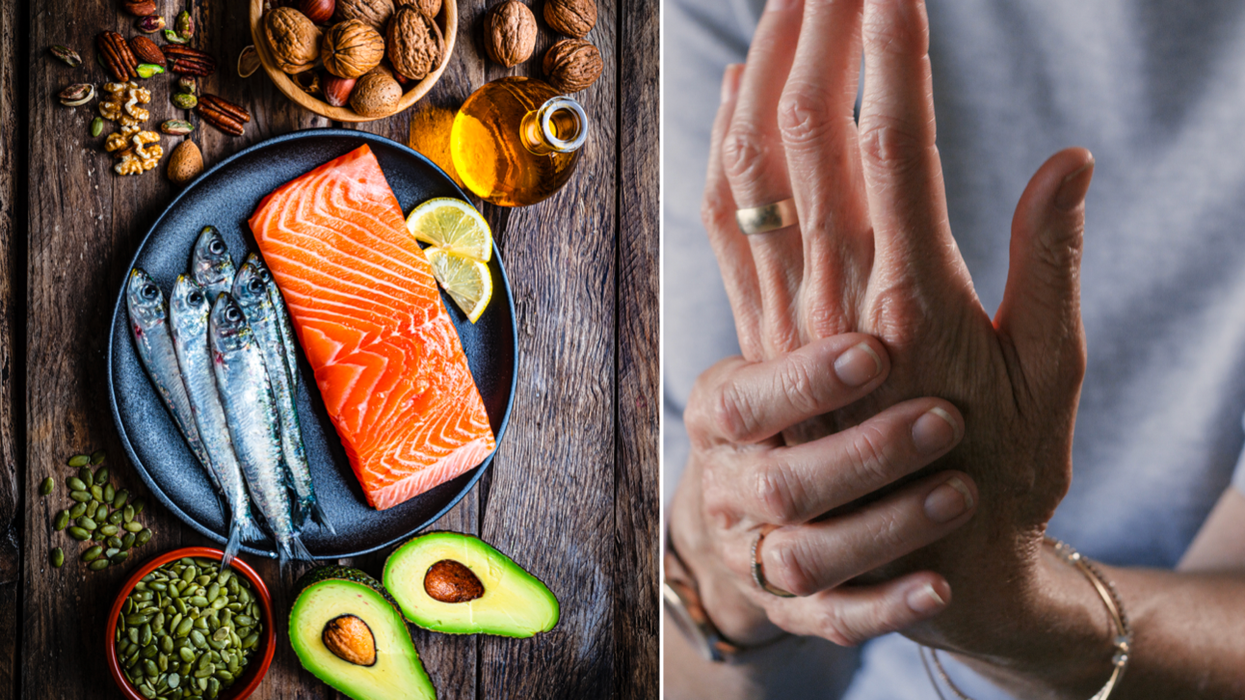'I’m a rheumatologist - these are the eight best foods to alleviate painful arthritis symptoms'

Eating plenty of fatty fish, nuts and other healthy foods can alleviate painful arthritis
|Getty Images

Simple lifestyle changes to our diet can make a surprising difference, says Doctor Taher Mahmud, Co-Founder and Director of the London Osteoporosis Clinic
Don't Miss
Most Read
Latest
Arthritis is a common condition that causes pain and inflammation in a joint.
In the UK, millions of people have arthritis or other, similar conditions that affect the joints.
Some unhelpful myths persist around arthritis. Chief among them is that nothing can be done to alleviate symptoms.
Simple lifestyle tweaks can make a big difference, according to Doctor Taher Mahmud, Co-Founder and Director of the London Osteoporosis Clinic.
Those living with the painful condition can help manage their symptoms and reduce inflammation which triggers pain by getting plenty of important nutrients which help maintain joint and bone health, he says.
In an exclusive interview with GB News, the rheumatologist shares eight foods that can alleviate joint pain.
Fatty fish
Doctor Taher Mahmud said: "Fish such as salmon and mackerel are excellent sources of omega-3 fatty acids, ‘healthy fats’ known for their anti-inflammatory properties.
"Omega-3s significantly maintain joint health and reduce morning stiffness and pain intensity which is common in arthritis sufferers.
"You can also take omega-3 supplements if you aren’t big fans of fish or have a plant-based diet."
What the research says
Several studies have found that fish oil supplements or a diet rich in fish oils may be helpful in controlling the inflammation of rheumatoid arthritis.
A study published in the medical journal Arthritis Care and Research found that the more fish a person consumes, the better the control of their arthritis.
In this study, researchers analysed data from 176 people with rheumatoid arthritis, comparing their reported intake of non-fried fish with the results of their joint examinations and blood tests. Here's what they found:
- Those with the highest fish consumption (more than two servings per week) had the best control of their arthritis.
- There was a "dose effect". For minimal, low, or high fish consumption, the higher the intake, the better the arthritis.
- The findings were noted even after accounting for other factors that might affect arthritis control, such as duration of disease and fish oil supplement use.
Broccoli
Doctor Taher Mahmud said: "Broccoli contains sulforaphane, which can slow the progression of osteoarthritis.
"Additionally, broccoli’s high fibre content aids overall digestion and health, reducing inflammation."
What the research says
A compound found in broccoli could be key to preventing or slowing the progress of osteoarthritis - the most common form of arthritis, according to research led by the University of East Anglia (UEA).
Results from the laboratory study show that sulforaphane slows down the destruction of cartilage in joints associated with painful and often debilitating osteoarthritis.
Sulforaphane is released when eating cruciferous vegetables such as Brussels sprouts and cabbage, but particularly broccoli.
Garlic
Doctor Taher Mahmud said: "Garlic is another potent anti-inflammatory that can reduce the severity of arthritis symptoms.
"The sulphur in garlic lowers the production of pro-inflammatory proteins in our immune system, making it an effective natural remedy."
What the research says
Researchers evaluated a garlic supplement's effects on serum levels of some inflammatory biomarkers, clinical symptoms, and fatigue in women with active rheumatoid arthritis.
In a randomised, double-blind, placebo-controlled trial study, 70 women with RA were randomly divided into two groups: The intervention group was supplemented with 1,000 mg of garlic, and the control group received placebo for eight weeks
After intervention, serum levels of inflammatory biomarkers decreased significantly in the garlic group as compared with the placebo group.
Also, pain intensity, tender joint count, disease activity score, and fatigue were significantly decreased in the intervention group compared with the control group.
Swollen joint count was significantly decreased in the garlic group, but not in the placebo group.
"Garlic supplementation by improving inflammatory mediators and clinical symptoms can be considered as a potential adjunct treatment in patients with RA. However, further studies with larger duration are needed," the researchers concluded.
Nuts
Doctor Taher Mahmud said: "Almonds and walnuts are packed with healthy fats and antioxidants, aiding in inflammation reduction.
"These nuts also provide protein and magnesium, essential for bone health and reducing inflammation. They are also a great addition to your diet if you don’t eat meat or avoid animal products."
What the research says
In a study, published in Advances in Nutrition, researchers aimed to summarise the current literature to determine whether almonds can affect inflammatory markers.
The researchers found almond consumption beneficially affects inflammatory markers in adults.
Another study involving 5,013 people also found that more frequent consumption of nuts, including walnuts, was associated with reduced markers of inflammation.
Leafy greens
Doctor Taher Mahmud said: "Spinach and kale provide essential vitamins and antioxidants that combat inflammation.
"These greens are also rich in calcium, crucial for maintaining bone density. In inflammatory diseases such as some types of arthritis, the body misdirects inflammation to attack the body. Lowering this inflammation response is an important part of treating arthritis."
What the research says
Several studies have found that a higher intake of fruits and vegetables is linked to lower levels of inflammation.
Spinach, in particular, contains plenty of antioxidants and plant compounds that can relieve inflammation and help fight disease, research shows.
Spinach is especially high in the antioxidant kaempferol, which has been shown to decrease the effects of the inflammatory agents associated with rheumatoid arthritis and osteoarthritis in animal studies.
Olive oil
Doctor Taher Mahmud said: "Olive oil, particularly extra virgin, contains oleocanthal, an anti-inflammatory compound with effects similar to the common anti-inflammatory drug ibuprofen. This oil can help reduce the inflammatory response and improve joint function."
What the research says
In addition to reducing inflammation, some research suggests that certain compounds found in olive oil could promote autophagy, a process that helps clear out damaged cells from the body, which could be beneficial for arthritis.
In one study, mice were fed extra-virgin olive oil for six weeks. This helped stop the development of arthritis, reduce joint swelling, slow cartilage destruction, and decrease inflammation.
Berries
Doctor Taher Mahmud said: "Strawberries and blueberries are rich in antioxidants and vitamins. They reduce inflammation and provide a sweet treat to refined sugar.
"They can help lower the body’s craving for unhealthy, highly refined sugar. The fibre in berries supports overall digestive health and helps reduce inflammatory processes in the body."
What the research says
According to one small study, consuming 40 grams of freeze-dried blueberry powder per day for four months improved pain, stiffness, and gait performance in 79 people with knee osteoarthritis, compared to a placebo.
Similarly, another small study in people with knee osteoarthritis and obesity showed that consuming 50 grams of a freeze-dried strawberry beverage decreased markers of inflammation and reduced pain and cartilage degradation over 26 weeks.
Strawberries have also been shown to reduce markers of inflammation, such as tumour necrosis factor-alpha, in adults with knee osteoarthritis.
Cherries
Doctor Taher Mahmud said: "Tart cherries in particular are rich in anthocyanins, compounds that reduce inflammation and relieve pain. Research has shown that cherry consumption can lower the levels of inflammatory markers in the body, easing joint pain and stiffness.
"The most common types of arthritis in the UK are osteoarthritis, where tissues in the joint break down causing painful bone-on-bone pain and stiffness, and rheumatoid arthritis, where inflammation in the joints causes painful deformities and a lack of movement, particularly in the hands and feet.
“Incorporating these foods into your diet can be a natural and effective way to manage arthritis symptoms as part of a holistic approach to your health,” says Dr Mahmud. However, individual variations exist, and what works for one person may not work for another. Therefore, it is best to carefully explore different foods and preparation methods to find what works best for you.”
What the research says
A review of 29 studies published in the journal Nutrients found consumption of sweet or tart cherries can promote health by preventing or decreasing oxidative stress - a process that can lead to joint destruction - and inflammation.
Another study in 57 people with knee osteoarthritis found that consuming tart cherry juice daily for 120 days improved mobility, pain, and quality of life.
Another four-week study showed that tart cherry juice significantly reduced CRP and uric acid levels — a compound that may be linked to osteoarthritis — by 19.4 percent and 19.2 percent, respectively.










